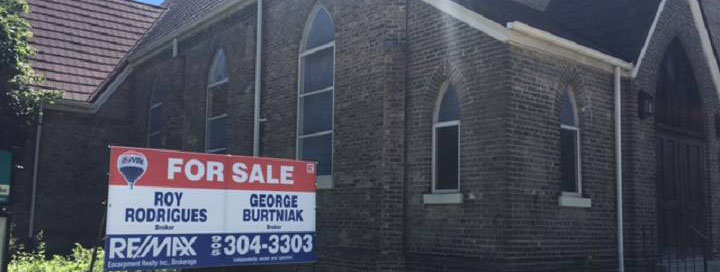Congregations must put faith and calling before revenue when contemplating renting, leasing or selling church property in response to declines in giving and attendance, said Dominic Dutra, author of Closing Costs: Reimagining Church Real Estate for Missional Purposes.
Church leaders and members should engage in robust conversations about the mission and character of the church before putting buildings or campuses on the market, Dutra added during, “Too Much Property, Too Few People: Where Do We Go from Here?” an Oct. 24 webinar hosted by the Baptist Studies Center at Abilene Christian University.

Dominic Dutra
“It’s not even a real estate question, it’s a spiritual issue. The most important question is whether this road of discernment, and figuring out what to do from a real estate perspective, is driven by God’s inspiration to seek out new life,” said Dutra, whose book reflects his experience as a real estate consultant for faith-based, educational, nonprofit and other organizations.
Given the ongoing numerical decline of the American church, Dutra said it’s important that congregations understand that putting mission over survival often includes moving on from beloved buildings altogether. “That’s why I very often talk about the Parable of the Talents and the fact that these properties are not ours and that God wants to see us invest these resources in new life.”
Center Director and webinar moderator Myles Werntz noted that American churches are under a tremendous amount of pressure in the present culture, with a nationwide median attendance of 75.
“The vision of the megachurch oftentimes gets to be the way in which we think about what churches are and how churches operate,” he said. “But the reality is that churches are operating with far less people than that. So, an enduring question for congregations now is how to be faithful not just with our teaching and with our time, but with our property as well.”
The property management decisions of struggling churches often are clouded by fear, grief and other emotions, Dutra said. “The knee jerk reaction is one of survival. … ‘We’re getting smaller. We need to replace our roof, our carpets. We need to paint our place. Let’s start focusing on how we can come up with the money. Oh, OK, let’s lease to an ethnic church or a preschool or something that will help us just stay afloat.’”
That is no way to make life-changing decisions about the future of a congregation’s ministry, he said. “I really want them to look at the ethos of the church and the depth of the church and use that as an opportunity for the rebirth of a new life.”
“For many of us, it was a cultural hub. It was our relational, communal hub, and so it’s a huge part of our life.”
But the urgency for self-preservation is understandable, as is the depth of the emotional pain resulting from grief and loss of the way a church once was, Dutra said. “When we think of the church, we think of a place that’s where we got married, where our kids got baptized, where we have had funerals for loved ones. For many of us, it was a cultural hub. It was our relational, communal hub, and so it’s a huge part of our life.”
But that must not hold churches back from embracing an uncertain future, he advised. “We’re at a tipping point in in the United States with the Christian church, and we’re either going to revive ourselves or we’re not.”
Leasing, merging or selling can be healthy approaches for churches that have worked through the emotional and spiritual challenges that demand change, Dutra said. In those cases, he suggested congregations consult real estate experts familiar with their mission and needs to determine the best options.
Dutra said leases are his first choice because through them ministries can retain properties, increase revenues and also help properly vetted organizations meet their goals.
Mergers can be effective, too, as long they are not rushed and do not involve a strong church simply taking over a weaker one as a satellite location, he said. “I counsel churches to really think hard about mergers because they can be a success, but they can also be very challenging. You always hate to see a merger that doesn’t work. I’ve seen it successfully handled, but again it really does take a lot of humility.”
Selling off chunks of property can be effective for congregations that own large parcels or multiple facilities. But Dutra said he also has coached dwindling-but-faithful congregations through the process of selling all their physical property for use as affordable housing or other causes.
“The healthy churches focus on how they can use this resource for new life.”
“The healthy churches focus on how they can use this resource for new life, and I think the healthiest ones look at it knowing they may not be part of it, they may not lead it, but they will see it,” he said. “The healthy ones realize they’re not the owners, they’re just the stewards.”
Getting to that place requires congregations to be willing to embrace uncertainty and patience throughout the experience, he said. “It is going to be a multi-year process. This is not going to happen overnight, and you need, as a church, to be committed to this journey.”
“If we’re going into this with that sort of mindset that says God’s going to take the inadequacies of this time — whether we’re lacking funds or lacking people or lacking programs or lacking the ability even to afford staff — God will show us the way, whatever that way is.”
Related articles:
7 dos and don’ts when considering the redevelopment of church property | Opinion by Rick Reinhard
Property sale positions Atlanta church to engage its vibrant neighborhood
Church building for sale but congregation’s mission continues

